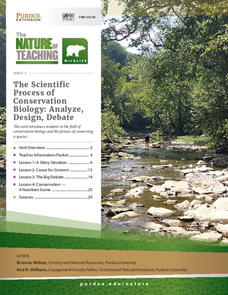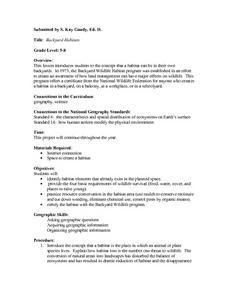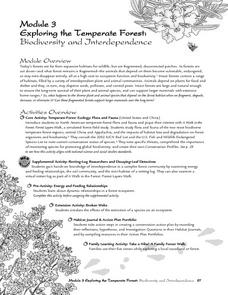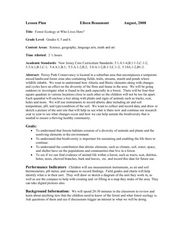Purdue University
Animal Diversity and Tracking
What exactly are those glowing eyes in the night? Learners run an experiment to attract local wildlife and then document the number of visitors by identifying their tracks. They then analyze the data to draw conclusions about the types...
Purdue University
The Scientific Process of Conservation Biology: Analyze, Design, Debate
Scientists use data to learn about species survival—and your classes can too! A set of four lessons guides learners through a process to draw conclusions about the fluctuations in the population of the Hellbender species. They read...
Curated OER
Design a Wildlife Habitat-Habitat Detective
Learners discuss ways people have changed landscapes and how this effects wildlife. They map the area around their school and keep a journal of wildlife they see. They predict how to preserve the wildlife they see for future generations.
Curated OER
Wild Dog Urine
Learners investigate biology by researching wild animals. In this animal extinction lesson, students research African wild dogs and discuss the impact of the environment on their survival. Learners read and analyze an article titled...
Curated OER
Postcards from the Edge: Endangered Species
Students use the internet to identify the endangered species in their state. Using this information, they create a postcard with a picture of the animal along with facts. They discuss the main reasons to protect the endangered species...
Howard Hughes Medical Institute
Lesson 7: Observations Across Habitats
How are animals in separate but nearby habitats related? Ecology scholars compare the animal inhabitants of the Gorongosa National Park in part seven of an eight-part series. Learners study photos from two different habitats, then...
Curated OER
Backyard Habitats
Students identify habitat elements. They create a habitat in a backyard, on a balcony, at a workplace, or in a schoolyard and provide the four basic requirements of wildlife survival (food, water, cover, and places to raise young). They...
Curated OER
Biomes -- Part II
Students use the internet to gather information on the biomes of the world. They identify the climate and unique characteristics of each biome along with any threat to them. They create their own campaign to preserve wildlife.
Curated OER
Habitat
Young scholars are able to define habitat. They are able to identify the four things that living things need to survive. Students are able to describe how living things are adapted to their habitats.
Curated OER
Habitat for Sale
Students are able to define habitat, and identify the four things that living things need to survive. They are able to describe how living things are adapted to their habitats.
Curated OER
Adaptations
Students are able to describe protective adaptations of animals. They are able to categorize the animals based on their protective adaptations. Students discuss adaptations of animals. They are explained that an adaptation helps an...
Curated OER
Exploring the Temperate Forest: Biodiversity and Interdependence
Students examine the consequences of cutting down large amounts of forests throughout the world. In groups, they use the internet to complete a module taking them on a tour through different temperate forests. To end the lesson, they...
Curated OER
Forest Ecology or Who Lives Here?
Students explore a hardwood forest. In this forest ecology lesson, students examine the diversity and animals and plants as they explore their habitats at Poricy Park Conservatory. Students determine how biodiversity and abiotic elements...
Curated OER
Monitor Marine Migrants
Students, in groups, track the seasonal journey of a species, such as a shorebird, sea turtle, or marine mammal, using various sources of migration data
Curated OER
Nebraska Rocks & The Rock Cycle
Students study the rock cycle and relate it to rocks that are indigenous to Nebraska. Students collect rocks and draw a diagram of the rock cycle using their collection.














